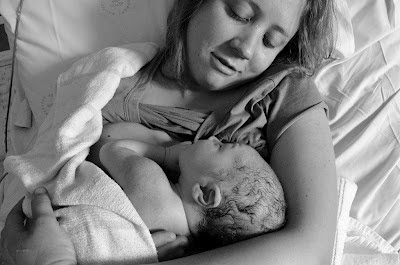 |
| A mother gazes at her newborn infant |
ACTIVITY: Looking at your baby's face, looking into baby's eyes and making animated expressions and smiling.
This is a simple activity that can be done anytime and there is a lot of science backing up the reasons why it is an important daily activity with your baby.
Babies are born with a remarkable ability that helps them identify faces. In experiments, newborn infants have shown preference for looking at faces over other visual stimuli ( Batki et al 2000). They also prefer faces with open eyes and happy faces over frowning ones. (Farroni et al 2007). Eye contact is an important signal in interactions with other people and successful communication depends on the ability to detect the intention to communicate (Frith 2007).
When your baby sees you smile, it releases chemicals in her body. This makes her feel good – and the chemicals also help babies brain grow.
See a diagram explaining the science behind this.
Parents' faces entertains baby and actually make baby feel more secure and safe. (Study at University of Delaware USA)
So this activity is important because it:
- creates and nurtures the bond between parent and child
- helps baby feel secure and safe
- helps baby develop and learn about the world
- helps develop communication skills
PHOTO CREDIT: Portrait of Zenon Thomas O'Donnell and his mother taken by Dylan O'Donnell
SCIENTIFIC SOURCES:
Batki A, Baron-Cohen S, Wheelwright S, Connellan J, Ahluwalia J. Is there an innate gaze module? Evidence from human neonates.
Farroni T, Mansfield E.M, Lai C, Johnson M.H. Infants perceiving and acting on the eyes: tests of an evolutionary hypothesis.
Farroni T, Johnson M.H, Menon E, Zulian L, Faraguna D, Csibra G. Newborn's preference for face-relevant stimuli: effects of contrast polarity. Frith C.D. The social brain? Frith C.D, Frith U. Social cognition in humans.
No comments:
Post a Comment